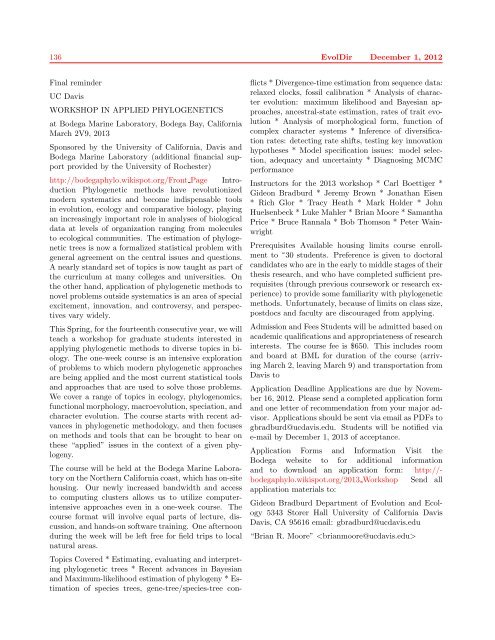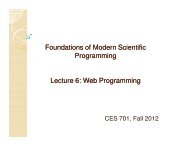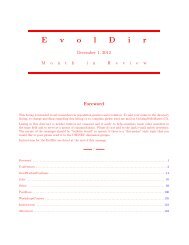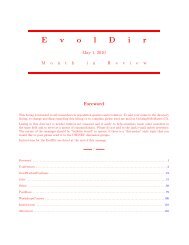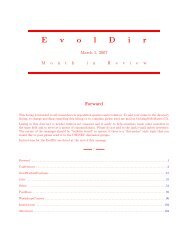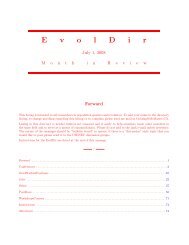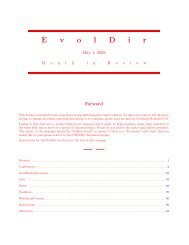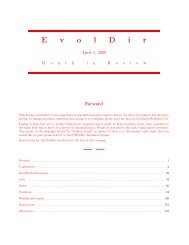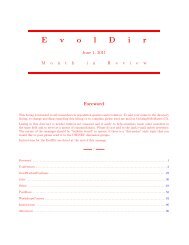E v o l D i r
E v o l D i r
E v o l D i r
You also want an ePaper? Increase the reach of your titles
YUMPU automatically turns print PDFs into web optimized ePapers that Google loves.
136 EvolDir December 1, 2012<br />
Final reminder<br />
UC Davis<br />
WORKSHOP IN APPLIED PHYLOGENETICS<br />
at Bodega Marine Laboratory, Bodega Bay, California<br />
March 2V9, 2013<br />
Sponsored by the University of California, Davis and<br />
Bodega Marine Laboratory (additional financial support<br />
provided by the University of Rochester)<br />
http://bodegaphylo.wikispot.org/Front Page Introduction<br />
Phylogenetic methods have revolutionized<br />
modern systematics and become indispensable tools<br />
in evolution, ecology and comparative biology, playing<br />
an increasingly important role in analyses of biological<br />
data at levels of organization ranging from molecules<br />
to ecological communities. The estimation of phylogenetic<br />
trees is now a formalized statistical problem with<br />
general agreement on the central issues and questions.<br />
A nearly standard set of topics is now taught as part of<br />
the curriculum at many colleges and universities. On<br />
the other hand, application of phylogenetic methods to<br />
novel problems outside systematics is an area of special<br />
excitement, innovation, and controversy, and perspectives<br />
vary widely.<br />
This Spring, for the fourteenth consecutive year, we will<br />
teach a workshop for graduate students interested in<br />
applying phylogenetic methods to diverse topics in biology.<br />
The one-week course is an intensive exploration<br />
of problems to which modern phylogenetic approaches<br />
are being applied and the most current statistical tools<br />
and approaches that are used to solve those problems.<br />
We cover a range of topics in ecology, phylogenomics,<br />
functional morphology, macroevolution, speciation, and<br />
character evolution. The course starts with recent advances<br />
in phylogenetic methodology, and then focuses<br />
on methods and tools that can be brought to bear on<br />
these “applied” issues in the context of a given phylogeny.<br />
The course will be held at the Bodega Marine Laboratory<br />
on the Northern California coast, which has on-site<br />
housing. Our newly increased bandwidth and access<br />
to computing clusters allows us to utilize computerintensive<br />
approaches even in a one-week course. The<br />
course format will involve equal parts of lecture, discussion,<br />
and hands-on software training. One afternoon<br />
during the week will be left free for field trips to local<br />
natural areas.<br />
Topics Covered * Estimating, evaluating and interpreting<br />
phylogenetic trees * Recent advances in Bayesian<br />
and Maximum-likelihood estimation of phylogeny * Estimation<br />
of species trees, gene-tree/species-tree con-<br />
flicts * Divergence-time estimation from sequence data:<br />
relaxed clocks, fossil calibration * Analysis of character<br />
evolution: maximum likelihood and Bayesian approaches,<br />
ancestral-state estimation, rates of trait evolution<br />
* Analysis of morphological form, function of<br />
complex character systems * Inference of diversification<br />
rates: detecting rate shifts, testing key innovation<br />
hypotheses * Model specification issues: model selection,<br />
adequacy and uncertainty * Diagnosing MCMC<br />
performance<br />
Instructors for the 2013 workshop * Carl Boettiger *<br />
Gideon Bradburd * Jeremy Brown * Jonathan Eisen<br />
* Rich Glor * Tracy Heath * Mark Holder * John<br />
Huelsenbeck * Luke Mahler * Brian Moore * Samantha<br />
Price * Bruce Rannala * Bob Thomson * Peter Wainwright<br />
Prerequisites Available housing limits course enrollment<br />
to ~30 students. Preference is given to doctoral<br />
candidates who are in the early to middle stages of their<br />
thesis research, and who have completed sufficient prerequisites<br />
(through previous coursework or research experience)<br />
to provide some familiarity with phylogenetic<br />
methods. Unfortunately, because of limits on class size,<br />
postdocs and faculty are discouraged from applying.<br />
Admission and Fees Students will be admitted based on<br />
academic qualifications and appropriateness of research<br />
interests. The course fee is $650. This includes room<br />
and board at BML for duration of the course (arriving<br />
March 2, leaving March 9) and transportation from<br />
Davis to<br />
Application Deadline Applications are due by November<br />
16, 2012. Please send a completed application form<br />
and one letter of recommendation from your major advisor.<br />
Applications should be sent via email as PDFs to<br />
gbradburd@ucdavis.edu. Students will be notified via<br />
e-mail by December 1, 2013 of acceptance.<br />
Application Forms and Information Visit the<br />
Bodega website to for additional information<br />
and to download an application form: http://bodegaphylo.wikispot.org/2013<br />
Workshop Send all<br />
application materials to:<br />
Gideon Bradburd Department of Evolution and Ecology<br />
5343 Storer Hall University of California Davis<br />
Davis, CA 95616 email: gbradburd@ucdavis.edu<br />
“Brian R. Moore”


